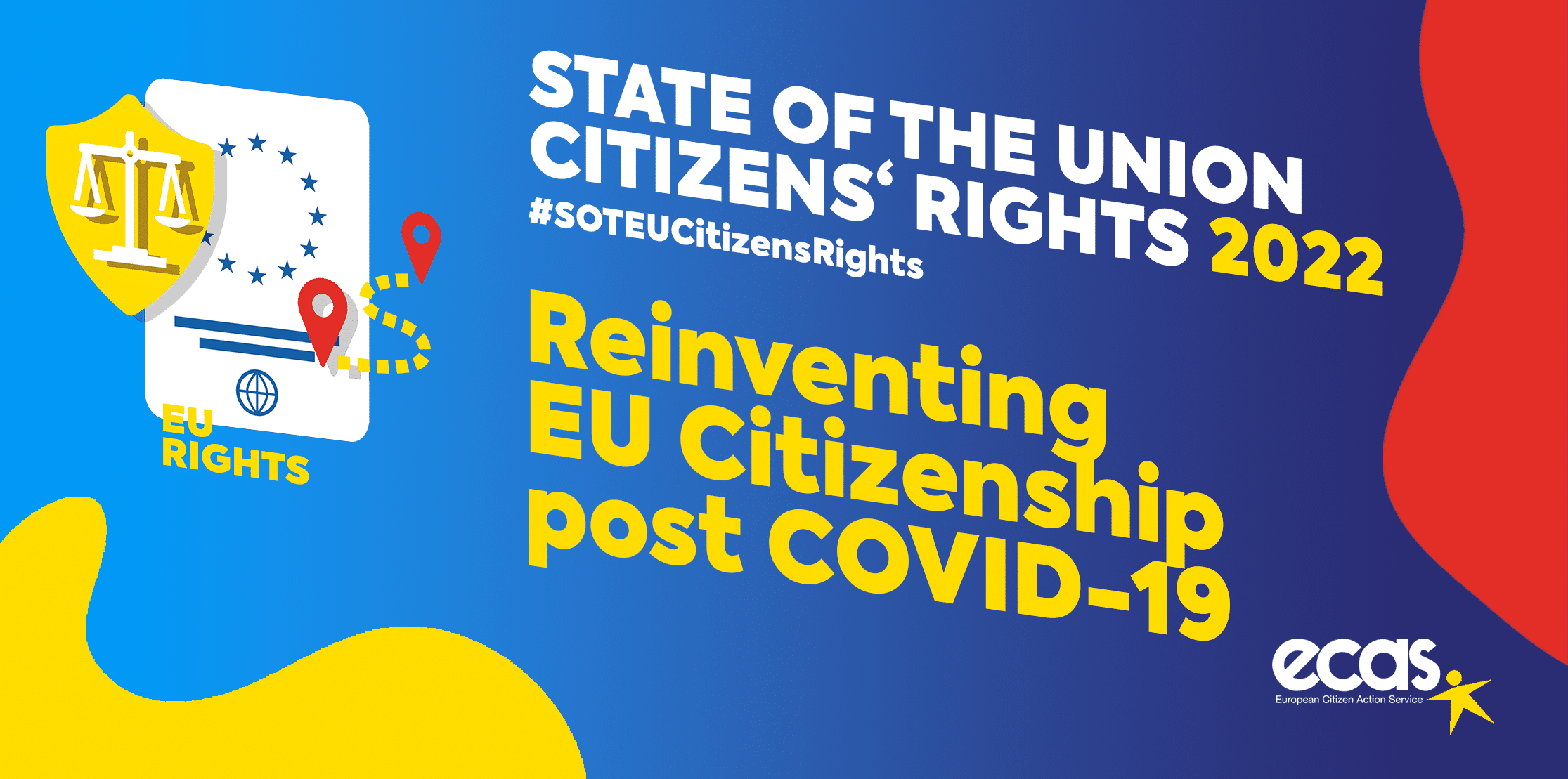The COVID-19 pandemic has affected many aspects of EU citizens’ lives: the ways we travel, the ways we work, the ways we meet our family members and friends.
ECAS research shows that the initial outbreak had a particularly serious impact on mobile EU citizens, as it magnified the obstacles that they have been facing in their host countries. Everyone has had to endure the crisis but the pressure placed on those exercising their freedom of movement rights has been particularly high.
More than two years after the outbreak of the pandemic, there is finally hope of “a long period of tranquility”, according to the
World Health Organisation. Thanks to the high percentages of the vaccinated population, the low virulence of the Omicron variant and the end of winter, it seems that our European way of life might slowly return to normal. But do Europeans really want it the way it was or do citizens expect changes and reforms for a better, more sustainable and fairer European Union?
Freedom of movement was one of the first victims of COVID-19. The initial response to the pandemic took place at nation-state level and revealed a lack of solidarity and coordination among the Member States. The European Commission has committed to addressing the restrictions on free movement in the upcoming 2022 Communication on Directive 2004/38/EC.
The pandemic has also challenged other EU fundamental rights and democratic values, including the right to participate in the democratic life of the Union. Not only were elections postponed, but data indicates that COVID-19 has had a negative impact on turnout rates, which, in the long-term, may affect the legitimacy of the officials elected during the pandemic and the respective decision-making process.

The State of the Union Citizens’ Rights 2022: Reinventing EU Citizenship post-COVID-19 conference will take an in-depth look at the obstacles that mobile EU citizens have been facing as a result of the COVID-19 pandemic and the complicated Brexit process. It will also explore visions on how to reinvent and enrich EU citizenship in the coming years so that it becomes fairer, more inclusive and crisis-resistant.
You can view the draft agenda below, or download it here.  Loading…
Loading…
Draft Agenda
9:30 – 9:45 | Keynote speech
Yana Toom, Member of the European Parliament, Renew Europe Group, Vice-Chair of Committee on Petitions, Rapporteur of the EP Report on the EU Citizenship 2020
9:45 – 10:30 | Panel discussion: Challenges in the EU citizenship field
Moderator: Assya Kavrakova, Executive Director, ECAS
Your Europe Advice annual trends
Claire Damilano, Senior Legal Manager, ECAS &
Marrit Westerweel, Citizens’ Advice Coordinator, ECAS
Brexit-related challenges
Julie Bishop, Director, Law Centres Network
The Impact of COVID-19 on Service Providers and Homeless People
Simona Barbu, Policy Officer, FEANTSA
Potential impact of AI on citizen rights
Dimitris Kyriazanos, Associate Researcher in the Institute of Informatics and Telecommunications of the National Centre for Scientific Research “Demokritos” (NCSRD)
Discrimination against mobile European Union citizens before and during the first COVID-19 lockdown: Evidence from a conjoint experiment in Germany
Carolin Hjort Rapp, Associate Professor at the Department of Political Science at the University of Copenhagen
10:30-10:40 | Q&A session with the audience
10:40-10:50 | Coffee break
10:50-11:20 | Changing narratives on freedom of movement – results of the CORE campaign and lessons learnt
Assya Kavrakova, Executive Director, ECAS;
Eoin Young, Programme Director, ICPA;
Omri Preiss, Managing Director, Alliance4Europe
11:20-12:00 | Panel discussion: Reinventing EU citizenship
The upcoming Communication on Directive 2004/38/EC and the revision of voting Directives
Sybille Luhmann, Policy Officer for Free Movement and Citizen Rights at the Directorate-General for Justice and Consumers
The European citizenship of the future
Francesca Strumia, Senior Lecturer and Director of Internationalization, University of Sheffield
EU social citizenship
Maurizio Ferrera, Professor of Political Science, University of Milan
Recommendations of the “European Way of Life” cluster of the Civil Society Convention on the Future of Europe
Piotr Sadowski, Secretary General, Volonteurope
12:00-12:30 | ECAS Awards 2021 on European Citizenship Innovation
Moderator and concluding remarks: Jean Lambert, former MEP, Vice-chairperson of ECAS’ Board of Directors
Meet the Speakers
- Yana Toom was born in Tallinn in 1966. She went to an Estonian-language kindergarten and then to Russian-language school, where there was special emphasis on the study of the English language. In addition, she attended music school (piano) and art school. She studied Russian philology in Tartu and researched the literary links between Aleksandr Blok and Innokenty Annensky. However, she did not graduate from the university because of the birth of her children.After the restoration of independence to the Republic of Estonia, she left for Chelyabinsk Oblast in Russia with her husband, who had also been studying in Tartu but was not granted residency in Estonia. She returned in 1994, having dreadfully missed Tallinn, and she joined the newspaper Molodyozh’ Estonii as a correspondent. She worked for the newspaper for two years and then took a position in the weekly newspaper Den’ Za Dnem, where she became editor-in-chief in 1999. In 2006, she transferred to the same position in the newspaper Vesti Nedeli.Yana Toom joined Keskerakond (the Centre Party) in 2008. After leaving Vesti Nedeli, she worked as chief editor for the Tallinn newspaper Stolitsa. In 2010, she became Vice-Mayor of Tallinn for Culture, Education and Sport; in 2011, she ran for election to the Riigikogu (Estonian Parliament) and became a Member of the Riigikogu. In 2014, she ran for election to the European Parliament and became a Member of the European Parliament (25,251 votes). Five years later, she sought re-election to the European Parliament, secured 26,990 votes and is now serving her second term in the European Parliament.
- Julie Bishop has been Director of the Law Centres Network in the UK since 2008. Prior to this, Julie was Director of the National Association of Community Legal Centres in Australia and worked in the access to justice sector at community level for almost 20 years.Julie’s professional training is in IT / Digital. It was in this field that Julie first worked in the legal sector. Before IT, Julie studied and taught Philosophy.
- Simona Barbu is a Policy Officer at the European Federation of National Organisations working with Homeless People (FEANTSA), the only major European network that focuses exclusively on combating homelessness at European level. In her work within FEANTSA, Simona focuses on the relation between migration, free movement and homelessness and how to protect the rights of destitute mobile EU citizens. Previously, she was part of a leading Roma rights organisation in Romania, where she is originally from, and before joining FEANTSA has worked in Denmark with research projects and for assisting EU citizens from Central and Eastern Europe living in homelessness.
- Maurizio Ferrera is Full Professor of Political Science at the Department of Social and Political Sciences of the University of Milan, Italy.
- Piotr Sadowski Piotr Sadowski has been President of Social Platform since April 2019, having first been elected to the Management Committee in 2017. He has been Secretary General of Volonteurope since 2008. He was directly involved in the advocacy and subsequent implementation of the 2011 European Year of Volunteering (EYV), as a member of the 2011 EYV Civil Society Alliance
Executive Group. In 2021 he was elected as Volonteurope’s representative to the Steering Group of the Civil Society Convention on the Future of Europe, where he has been co-chairing a recommendations cluster on the theme “Our European Life”, together with Gabriella Civico from CEV. Piotr represents Volonteurope and wider European Civil Society interests in the EESC Liaison Group and, within the pillars of the Council of Europe, he is an elected member of the INGO Conference Standing Committee, with a particular remit on safeguarding social rights throughout Europe.
- Jean Lambert joined the ECAS Board in 2019, after twenty years in the European Parliament as a UK MEP. In that time, she worked on issues including Free Movement, Social Security Co-ordination, employment and migrant rights, social inclusion and anti-discrimination
- Assya Kavrakova has 20 years of experience in senior management positions in the non-governmental sector, including skills to manage diverse portfolios of projects and activities. She has excellent leading abilities in managing full-time employees, as well as a wide variety of expert networks that are mission and product delivery oriented. She possesses in-depth knowledge of EU Funding Rules and Procedures, EU structural and Cohesion Policy, Schengen regulatory framework, EU external policy decision-making, EU enlargement policy and leverage, European citizenship and Rights framework and EU civic participation formal and informal mechanisms.
- Claire Damilano joined ECAS in 2001, is a qualified lawyer from France specializing in International and European Social law. She previously worked in the Human Resources department of a French NGO called AFIJ, and has also worked as a researcher for the University Paris X. She is also Vice President of the « Maison de l’Europe de la Grande Thiérache » (North of France).
- Marrit Westerweel worked as a Dutch language instructor and instructor coach, prior to ECAS. She also worked in the NGO sector. Marrit has Bachelor ‘s Degrees in Journalism and in International Relations and Master Degrees in International Crimes and Criminology and in teacher education in culture and social sciences. She is currently a PhD researcher at the University of Maastricht.
- Dimitris Kyriazanos is an Associate Researcher in the Institute of Informatics and Telecommunications of the National Centre for Scientific Research “Demokritos” (NCSRD), in Athens, Greece. His research areas of interest include data protection, AI ethics-by-design and cyber-physical resilience. He is the project coordinator of EU H2020 pop AI project (https://www.pop-ai.eu/), which addresses human factors and ethical, societal, legal and organisational aspects of using AI in support of Law Enforcement.
- Sybille Luhmann is a policy officer for Free Movement and Citizen Rights at the Directorate-General for Justice and Consumers Rights
- Omri Preiss is managing director and a co-founder of the nonprofit Alliance4Europe. An EU affairs and civil society professional in Brussels, he has worked in the European Parliament, and for human rights and sustainability NGOs on campaigning and advocacy.
- Francesca Strumia has been a Senior Lecturer in Law at the University of Sheffield since 2014. In summer 2022 she will join City,
University of London as a Professor of Law. Francesca’s research and writing focus on the concept, use and implications of citizenship in the transnational arena as well as on the relation between the status and rights of citizens, and the status and rights of migrants. Her most recent work on the ‘state and the citizen-as-migrant’ in the EU is available here <https://cadmus.eui.eu/handle/1814/73020> . She has published several articles and two books on these issues, including “Supranational Citizenship and the Challenge of Diversity-Immigrants, Citizens and Member States in the EU” (Martinus Nijhoff, 2013). Francesca has taught law in the US and in Italy, and prior to starting her academic career she has practiced law in major international law firms in London and Milan.
- Carolin Hjort Rapp is an Associate Professor at the Department of Political Science at the University of Copenhagen. Her main research interest lies in analysing attitudes towards outgroups, the origins and consequences of national identification, and survey methods.
- Eoin Young is co-founder and Programme Director in the International Centre for Policy Advocacy (ICPA). He has worked mainly as a trainer and mentor in supporting the development of policy research, analysis & advocacy capacity in the NGO and governmental sectors in the EU & Eastern Europe/Central Asia for more than 15 years. Eóin leads the ICPA policy capacity development team and a newer programme to support advocates in reframing public narratives in seemingly intractable, highly emotional issues, such as migration and shrinking civic space. Eóin is co-author of the recently launched ICPA Reframing Migration Narratives Toolkit and has a multidisciplinary education in Mechanical Engineering & Sociolinguistics.


 Loading…
Loading…